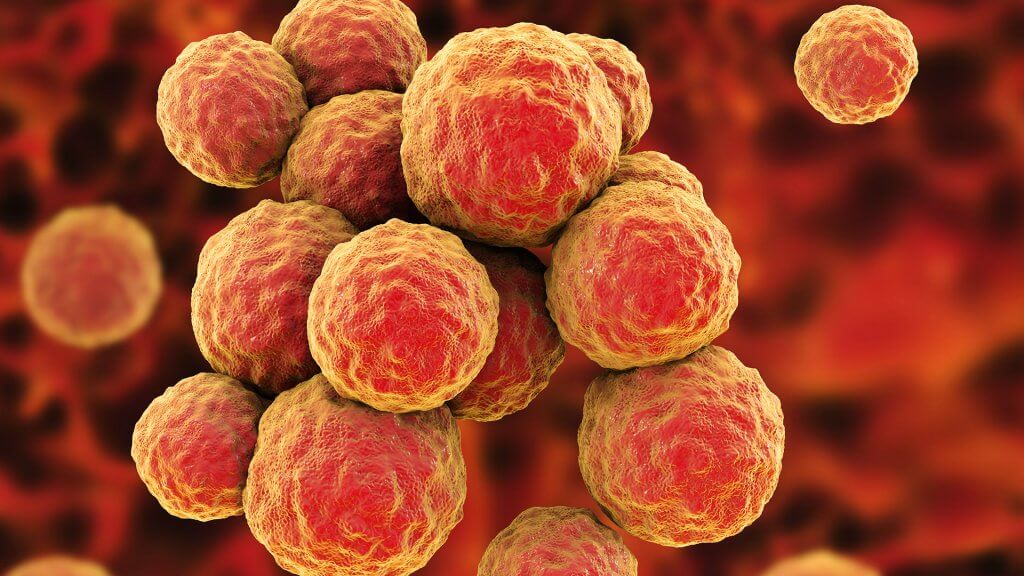General

Cheers to our skin! It protects, nourishes and detoxifies our body. Together with an ecosystem of microbes, our skin and its flora form a protective shield.
Naturally occurring microbes such as bacteria, bacteriophages and fungi live in a symbiotic relationship.
The natural skin colonization
Skin diseases caused by bacteria on the skin
What are skin bacteria?
Which bacteria are on the skin?
Staphylococci on the skin
Risk factors for bad bacteria on the skin
What is the role of bacteria on the skin?
Can bacteria be transferred on the skin?
Promote good bacteria on the skin with phages
It’s completely natural to have bacteria on our skin – the right bacteria even help us stay healthy!
Itching and redness – the skin gives clear signals, especially when the protective layer crumbles and it is in danger.
Healthy skin is equipped with an intact skin barrier and a balanced microbiome.
If different external and internal influences affect our body, an imbalance occurs.
Bacteria and fungi can multiply and cause diseases such as rosacea, neurodermatitis or acne. acne and acne.
Bacteriophages can help to rebalance the skin and eliminate the bad bacteria.
The symptoms of unpleasant skin diseases also disappear and the skin becomes healthy again.
In this article you will find out what skin bacteria actually are, what tasks they perform and how you can promote good skin bacteria.
In addition to 10 trillion of the body’s own cells, there are around 10 to 100 trillion bacteria on and in us – an unimaginable number.
These bacteria are good for us. Benign bacteria protect us by displacing malignant bacteria.
The vast majority of bacteria live in our intestines.

But bacteria are also found in the mouth and on our largest organ, the skin.
Among the skin bacteria are some that help to keep harmful bacteria and pathogens at bay.
If the top layer of skin (stratum corneum) is damaged or the skin flora is disturbed, germs that promote inflammation, such as Staphylococcus aureus, can multiply.
Wounds can become inflamed or trigger skin problems such as neurodermatitis.
The skin is colonized by a broad spectrum of bacteria.
Some of the most common bacteria on the skin are:
Most of our skin is colonized by Staphylococcus bacteria. For example, Staphylococcus epidermidis is a frequent guest on human skin. This protects our skin flora.

Staphylococcus aureus or Streptococcus pyogenes bacteria are also found on our skin. However, these can disturb our skin flora or cause diseases if they occur in excess.
Staphylococci are a group of bacteria that can be found on the skin and in the mucous membranes of humans. These bacteria are normally harmless, but can cause bacterial skin infections under certain circumstances.
Staphylococcal infections on the skin are usually caused by Staphylococcus aureus, also known as MRSA (methicillin-resistant Staphylococcus aureus). These bacteria can penetrate the skin if there are injuries or cracks in the skin that allow the pathogens to enter. But even healthy skin can be affected if the immune system is weakened.
The symptoms of staphylococcal infections on the skin can vary from mild to severe. The most common signs include
Our skin is an important barrier that protects us from harmful environmental influences. However, in certain situations, “bad” bacteria can colonize the skin and cause infections.
1. injuries and cuts:
One of the most common entry points for harmful bacteria are skin injuries and cuts. These open the door for pathogens that would otherwise have no chance of penetrating the skin. Regular skin care and proper cleaning of wounds are crucial to minimize the risk.
2. weakened immune system:
A weakened immune system can impair the skin’s defense mechanisms against bacteria. People with diseases that affect the immune system are more susceptible to skin infections. A healthy lifestyle, a balanced diet and sufficient sleep can help to strengthen the immune system.
3. lack of hygiene:
Inadequate hygiene practices, such as infrequent hand washing or sharing personal items, can increase the risk of bacterial colonization. It is important to encourage regular hand washing, clean clothes and towels and the avoidance of sharing hygiene items.
4. humid environments:
Moist skin provides an ideal environment for the growth of harmful bacteria. In tropical climates or during sport, when sweat remains on the skin, it is important to keep the skin dry and use suitable skin care products.
5. use of antibiotics:
Excessive use of antibiotics can disturb the balance of the skin flora and encourage the growth of harmful bacteria. It is important to take antibiotics only as prescribed by a doctor and according to the instructions.
6. stress:
Stress can affect the immune system and make the skin more susceptible to bacteria. Stress management techniques such as relaxation exercises and sufficient rest are therefore important.
In the course of evolution, a healthy and stable balance has developed between us humans and the bacteria that live on and in us.
Most of them are well-disposed towards us. They help to protect our skin from malignant bacteria.
There are also bacteria that have no particular benefit for us, but do not cause us any harm either. They are simply there and live by our side.
The third group are the malignant bacteria. They feed on our nutrients, but harm us in the process. They can lead to inflammation of the skin and thus cause acne.
In addition, they can disrupt the natural balance of our skin and thus promote diseases such as neurodermatitis or rosacea triggers.
These bacteria should be countered with appropriate treatment so that the skin regains its calm.
Yes, bacteria on the skin can be transmitted through direct skin contact. Our skin is a living organ that is colonized by a variety of bacteria, both beneficial (probiotic) and potentially harmful bacteria. Bacteria can be transmitted from one person to another through close skin contact, whether by shaking hands, hugging or other forms of contact.
The transfer of skin bacteria can lead to the spread of harmful pathogens that can cause infections. This is particularly important in terms of hygiene and the prevention of disease transmission. Washing your hands regularly and avoiding touching your face and eyes can help to minimize the transmission of bacteria on the skin.
In addition, the transmission of bacteria on the skin can also play a role in medical environments. In hospitals and healthcare facilities, compliance with strict hygiene standards is crucial to prevent the spread of pathogens.
Diseases such as acne and skin prone to neurodermatitis or rosacea can be caused by bad skin bacteria.
According to current studies1bacteriophages can restore this balance on the skin. As Staphylococcus aureus bacteria, which often cause skin problems, are reduced. Phages are completely natural.
You deserve healthy, beautiful skin – without redness, itching or spots.
Author: Christian Unterlechner, Dipl.-Ing. (FH), MBA
“From our own experience with neurodermatitis – and the long path of suffering associated with skin conditions like this – we started to look for alternative solutions to drug treatments. We are very happy to share the knowledge and experience that has gone into the years of developing our SkinCare products with you.”
Share post